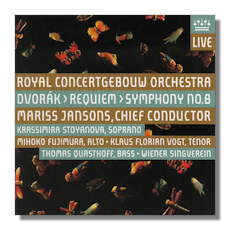
The Internet's Premier Classical Music Source
Related Links
- Dvořák Reviews
- Latest Reviews
- More Reviews
-
By Composer
-
Collections
DVD & Blu-ray
Books
Concert Reviews
Articles/Interviews
Software
Audio
Search Amazon
Recommended Links
Site News
 SACD Review
SACD Review
Antonín Dvořák

Requiem
- Requiem, Op. 89
- Symphony #8 in G Major, Op. 88
Krassimira Stoyanova, soprano
Mihoko Fujimura, alto
Klaus Florian Vogt, tenor
Thomas Quasthoff, bass
Wiener Singverein
Royal Concertgebouw Orchestra/Mariss Jansons
RCO Live RCO10001 Hybrid Multichannel SACD
This is a superb, idiomatic, stately and impactful recording of a live concert. Or, rather, a composite of two performances of the Requiem given on successive nights in February 2009 at the Royal Concertgebouw in Amsterdam; and over half a dozen performances of Dvořák's Symphony number 8. Mariss Jansons was conducting the Royal Concertgebouw Orchestra, of which he is chief conductor. The line-up of soloists is impressive: joining Krassimira Stoyanova (soprano) and Mihoko Fujimura (alto) were Klaus Florian Vogt (tenor) and Thomas Quasthoff (bass) with the Wiener Singverein.
Immediately noticeable is the passion and forthright sense of mourning that permeates this relatively late work by a Dvořák at the height of his powers and without an apparent care in the world. All the more striking, then, that, when asked only for an Oratorio by the committee of the Birmingham Festival in England in 1887, the composer should have responded – eventually, from 1890 – with a mass for the dead. That Dvořák was able to project into joyful times the unquiet and the unhappiness of a Requiem is an achievement that's often been remarked upon. The balance between seriousness and almost triumphant eloquence is nowhere better to be experienced than in the Sanctus and Benedictus [CD.1 tr.1]. Nothing florid; yet real movement and dynamism. Plenty of emotion and tension, yet no feeling that there are rifts or griefs that have to be resolved.
The same balance between grandeur and substance is true to some extent with Verdi's Requiem. And the performers on this RCO Live set strike just the right note to blend a tender and respectful examination of the dolorous text with melody and harmony which is exuberant and transparent. They also just avoid undue extroversion. Listen to the crescendi in the Offertorium [CD.1 tr.9], for example: the singers are supported by the instrumentalists in a reading that can't be ignored. But is forceful not for its own sake. The performers are responding with pure (not raw) emotion. They are letting the music do the work. Similarly the weeping Hostias [CD.1 tr.10]. Hearts bleeding but not on sleeves.
At the same time, so great is the technical competence of the soloists, so great the obvious commitment of the choir and so large the confidence of the orchestra all under the experienced and perceptive direction of Jansons that a great humanity, an approachability and a genuine warmth emerge and keep us company throughout the performance. It's thus an account that has its own momentum and at times seems to be reaching out for each listener in a strangely personal way. It's hard to think that Dvořák would not have approved of this.
Because death and the Requiem were – paradoxically – at best "friends", more nearly were unconnected (this is scarcely a liturgical work in the conventional sense of the term), it's a very positive "oratorio" with very positive intentions. Perhaps it could be said that it's a Requiem to comfort the living who are left behind, more than to honor the dead. This outward- and upward-looking sentiments have clearly been at the front of Jansons' interpretation.
Also very evident on this two-CD set (the composer's Eighth occupies the last 40 minutes of the second CD) is the sense of occasion. There is no mistaking, from the closing downbeat of the Recordare[CD.1 tr.6] for example, that this is a performance directed to the immediate pleasure of a rapt audience which hangs on the performers' every bar. Their "participation", though, is minimal to non-existent. A happy "best-of-both-worlds". The performance of the Eighth (completed the year before the composer worked on the Requiem) is spirited yet measured, open yet focused and likely to please every bit as much as do the vigor and dignity of the Requiem. As with the choral work, Jansons manages to make each individual movement work in the service of the whole.
The CDs come with a short introduction to the works in the accompanying booklet, the text of the Requiem and photos of the performers. The acoustic is clean and works well for the scope of the works. If you don't already own a recording of the Dvořák Requiem, the tempered magnificence, gravity and the way in which this performance is infused with a clarity of vision – not to mention the superb, very human technical aplomb must make this RCO Live recording a definite and very worthy front-runner.
Copyright © 2010, Mark Sealey.





















